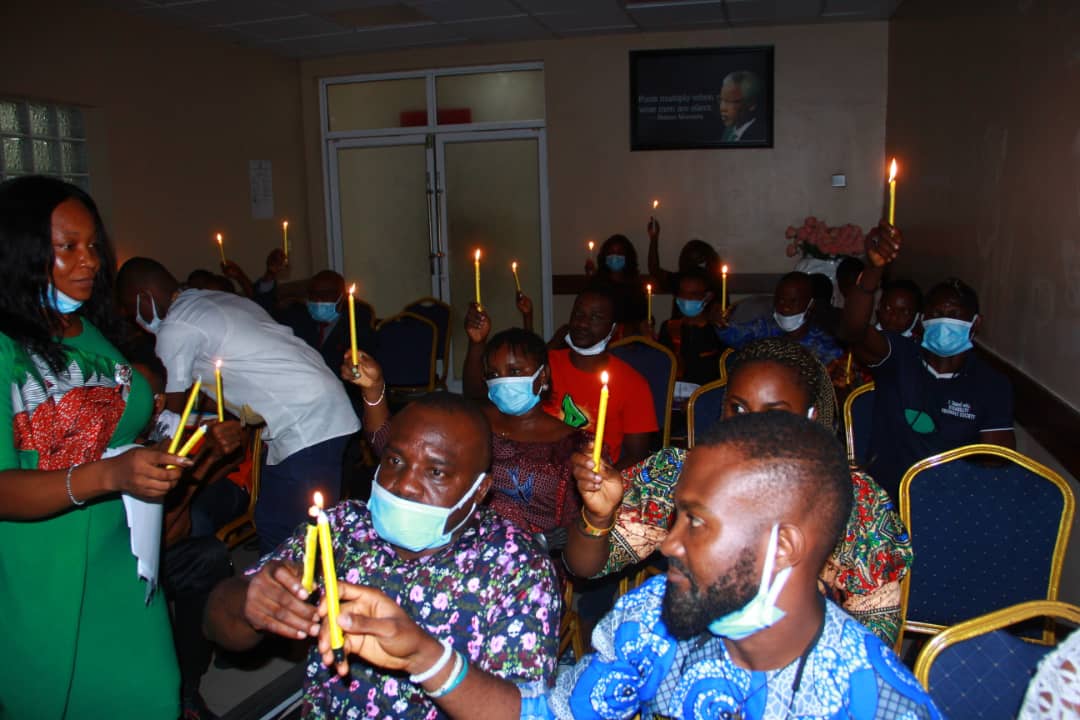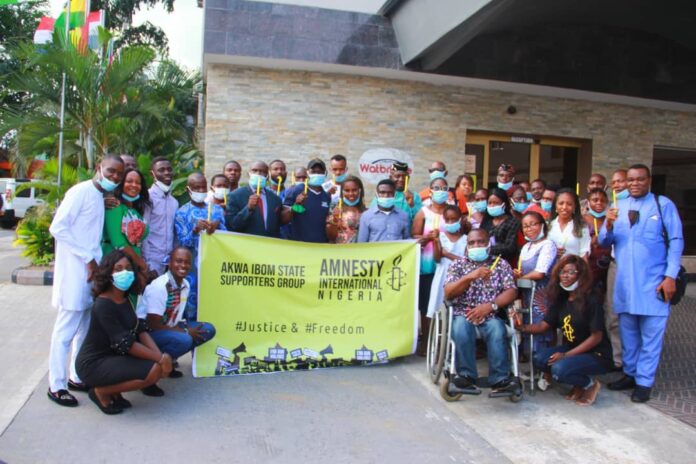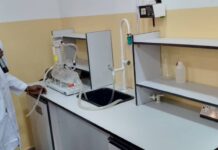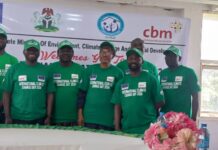Participants at a dialogue on disability rights to celebrate the 60th anniversary of Amnesty International in Uyo, Akwa Ibom State. (Photo credit: Edidiong Enang).
By Abasifreke Effiong, Uyo.
The rights of Persons With Disabilities, PWDs were the focus of a one day dialogue in Akwa Ibom state to mark the 60th birthday of Amnesty International on Saturday 29th May.
The consensus opinion at the dialogue was that persons with disabilities were “still facing obnoxious stereotypes” in Akwa Ibom state because the state government was still treating disability rights with levity.
Participants at the dialogue noted that the government of Akwa Ibom State, public and private organisations and local communities in the state have failed to recognise the inalienable rights of PWDs and take steps towards their inclusion and integration.
“Integration of PWDs is so poor” in Akwa Ibom state. The government does nothing tangible to promote disability rights except “occasional celebration of disability anniversaries”, participants at the dialogue emphasized.
READ : Railway vandalisation: Police officer rejects N600,000 bribe offered by Chinese suspect
The event which was organised by support groups of Amnesty International in Akwa Ibom state had participants from all clusters of PWDs in the state including the association of former leprosy patients called IDEA cluster.
In a remark, the state lead of Amnesty International support groups in Akwa Ibom, Mr. Unyimeabasi Essien Ben, said the dialogue aimed to promote the rights of disabled persons in Akwa Ibom State and chart ways towards ending discrimination against PWDs.
He said Amnesty International support groups in Akwa Ibom are worried about persisting discriminatory practices against persons with disabilities in the state as well as the state government’s unwillingness to guarantee the rights of PWDs.
Mr. Ben however thanked Amnesty International for its outstanding advocacies and interventions towards promoting human rights, equity and justice, and protecting the poor and vulnerable persons from victimisation in the 60 years of its existence.
In the experience-sharing session by participants, the dialogue noted regrettably that PWDs in the state including those working for the government were still facing discrimination in workplaces.
A participant from the national association of the blind who is working in state civil service said he has been denied promotion for almost 10 years and his junior has been promoted above him despite his qualifications.
Nigeria signed on to the United Nations Convention on the Rights of People with Disabilities, CRPD, in 2017 and its optional protocol in 2010. The convention prohibits discrimination on the basis of disability and imposes sanctions including fines and prison sentences on those who contravene it.
In February 2019, President Muhammadu Buhari signed into law the Nigeria’s Disability Rights Act 2019 which offers hope of inclusion and improved access to education, healthcare, housing and other services. This law has not been domesticated in Akwa Ibom State. It is on record that Governor Udom Emmanuel withheld assent to the Akwa Ibom State Disability Law 2019 passed by the State House of Assembly.
 PWDs in Akwa Ibom State hold a candle light session to mark 60th anniversary of Amnesty International during a dialogue on disability rights on Saturday 29th May. (Photo by Edidiong Enang).
PWDs in Akwa Ibom State hold a candle light session to mark 60th anniversary of Amnesty International during a dialogue on disability rights on Saturday 29th May. (Photo by Edidiong Enang).
Lead discussants on Disability Rights at the dialogue, Barr. Clifford Thomas, Ms. Mmanti Umoh and Mr. Ubong Udo, called on Governor Udom Emmanuel to reconsider the Akwa Ibom State Disability Law 2019 passed by the House of Assembly.
They urged heads of disability groups in the state to intensify effort in educating members of their clusters at the local level on disability rights, emphasising that rights awareness would help them to approach their demands from government and society from the right perspective.
A communique issued at the end of the dialogue calls on social and religious organisations in the State to create access to persons with disabilities.
The dialogue drew the attention of the government to the issue of insecurity and safety of inmates at leprosy hospital, Ekpene Obom, Etinan, stressed the need to reorganize the hospital.
Highpoint of the event was a candlelight session to celebrate the 60th anniversary of Amnesty International.
















